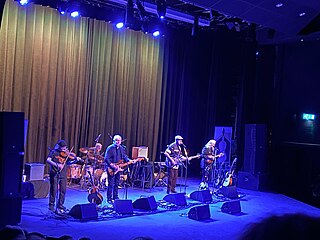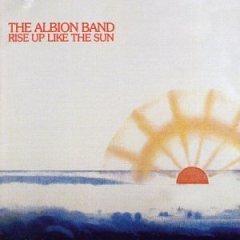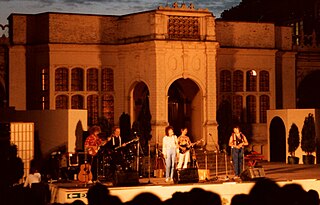External links
- http://www.bobpegg.com/ Official website of Bob Pegg
- http://www.innerasianmusic.com/carolepegg.htm
Mr Fox | |
|---|---|
| Origin | England |
| Genres | British folk rock – folk music |
| Years active | 1970–72 |
| Past members | Richie Bull Alan Eden Barry Lyons Andrew Massey John Myatt Bob Pegg Carole Pegg Nick Strutt |
Mr Fox were an early 1970s British folk rock band. They were seen as in the 'second generation' of British folk rock performers and for a time were compared with Steeleye Span and Sandy Denny's Fotheringay. [1] Unlike Steeleye Span they mainly wrote their own material in a traditional style and developed a distinct 'northern' variant of the genre. They demonstrate the impact and diversity of the British folk rock movement and the members went on to pursue significant careers within the folk rock and traditional music genres after they disbanded in 1972 having recorded two highly regarded albums.
Bob Pegg and Carole Butler (both born in 1944) met, as young folk singers, at the Nottingham Folk Workshop when they were still at school. Performing as a duo they began to establish a reputation in the Midlands, appearing regularly on the local TV news/magazine programme Midlands at Six. In 1963 they married and moved to Leeds, where Bob was studying English Literature. They continued to sing together and, in 1965, they contributed three tracks to the Transatlantic Records LP The Second Wave (other artists on the record were Harvey Andrews, Dave Sless and Spike Woods).
In 1967, at a gig in a Leeds rock venue, Bob and Carole met Ashley Hutchings, the Fairport Convention bass player. Ashley - known in those days as "Tyger" - became a regular guest in the Peggs' Leeds flat, which they shared with their young daughter Clancy. By this time Bob was researching the folk music of the Yorkshire Dales in the university's Institute of Dialect and Folk Life Studies, and Ashley/Tyger was captivated by the tape recordings of hardcore English traditional music that he heard in the Pegg household. The friendship continued in 1969, after the Peggs moved from Leeds to Stevenage, where Bob took up a post as lecturer in English at the College of Further Education. After a devastating road accident in which two people connected with Fairport Convention died, Ashley Hutchings left the band and went to live with the Peggs. By this time the Bob and Carole were well known nationally on the folk music scene as traditional performers, but they were interested in folk rock and had begun to write their own material. They discussed forming a band with Ashley, but, after a couple of unproductive rehearsals, he formed a new group, Steeleye Span, whose initial members included Tim Hart and Maddy Prior, Terry Woods, of the Irish band Sweeney's Men, and his wife Gay. During 1969 the Peggs had been making an LP for record producer Bill Leader, who encouraged them to write and record their own material (these recordings were released in 1971 as He Came From the Mountains). Some of the tracks, including a version of Sydney Carter's Lord of the Dance, used an instrumental line-up of fiddle, melodeon, cello, bass and drums, which was inspired by the old village bands of the Yorkshire Dales. This would become the hallmark of the Mr Fox band. Bill Leader played the tapes for Nat Joseph of Transatlantic Records, who signed the Peggs up, despite his having had a previous contractual disagreement with them in the aftermath of 1965's The Second Wave. For their first album they recruited Alan Eden (drums), Barry Lyons (bass), Andrew Massey (cello) and John Myatt (clarinet, bass clarinet, bassoon) and adopted the name Mr Fox, which was also the title of their signature song, based on a bloody English folk tale - a version of the Bluebeard legend - in which a young woman outwits a serial killer.
The group's first eponymous album, released in 1970, was unlike the work of Fairport Convention and Steeleye Span, as it diverged from a conventional rock band format. The material consisted of original compositions written by the Peggs, together with a Dave Mason tune, 'Little Woman,' and the songs 'Salisbury Plain' and 'Mr Trill's Song' which had music by Bob Pegg and lyrics by Ashley Hutchings. The use of classically trained musicians and the wide variety of instruments (including electric organ, melodeon, tin whistle, terrapin, fiddle, cello, flute, clarinet, bassoon, in addition to electric bass and drums) produced a hybrid sound which was predominantly acoustic in character. The album was well received by the music press and was made Melody Maker folk album of the year. [2]
Massey and Myatt left for economic reasons soon after the first album was released. As a result, the second album, The Gipsy (1971), had less complex instrumentation, but was more experimental. [3] A more varied album than the first offering, it was again based around self-penned material, but included two traditional songs 'The House Carpenter' and the final track 'All the Good Times', with new verses by Bob Pegg. The Gridley Tabernacle Choir and Orchestra are credited on 'All the Good Times'. In fact this was an invented name for an ad hoc gathering of musicians and singers - including Rod and Danny Stradling, and members of Swan Arcade - who were overdubbed three times to produce a massive chorus sound.
The band had a reputation as an unpredictable live act, sometimes startlingly good and sometimes lacklustre. At the Loughborough Folk Festival in 1971 they were on the same bill as Steeleye Span and, while the latter put in a memorable performance, Mr Fox were on bad form and the band was heavily criticised in the press, an event often seen as a turning point in the band's fortunes. [4] Recordings made by the couple before the group was formed were released as He Came from the Mountain (1971), but by this point the Peggs' marriage was already under strain. In 1972 Eden and Lyons quit to join Trees, and were replaced by guitarist Nick Strutt and Ritchie Bull on bass. When Carole left later that year the band dissolved.
Carole (as Carolanne Pegg) recorded an eponymous solo album in 1973, and briefly formed the band Magus with jazz R & B maestro Graham Bond before moving on to become a respected ethnomusicologist. Recordings of songs by Sydney Carter made by the Peggs before the band were formed were released as And Now it is So Early in 1973. Bob Pegg recorded two albums with Nick Strutt: Bob Pegg and Nick Strutt (1973) and The Shipbuilder (1974). He then made a solo album Ancient Maps (1975), before moving on to become an author, oral historian and entering theatre education. [5] The band's two albums were released as a double album set on vinyl in 1975 and on CD in 2004.
Despite the comparisons with Steeleye Span, Mr Fox had a very distinctive style from contemporaneous British folk rock bands. They did not rely on electric guitars, but did use drums. They also used a very wide range of instruments, prefiguring some of the developments that would be undertaken by The Albion Band and Home Service. Carole Pegg had an unusual fiddle style, quite unlike Fairport's Dave Swarbrick or Steeleye Span's Peter Knight, based partly on what she had learnt from older Yorkshire fiddle players. [6] They also used more complex, perhaps more staid, classical arrangements for their songs, leading one critic to note that their songs sounded, ‘as if they had been penned by Bartok’. [1] The distinctive feature of their music was the dominance of self-penned songs drawing on the atmosphere and folklore of the Yorkshire Dales, often, like 'The Hanged Man' (the story of a lost fell walker coming to grief), sounding like modern day Child Ballads. One thing they lacked was an outstanding singer like Maddy Prior or Sandy Denny, with Carole Pegg's vocals usually being perceived as eerie or atmospheric in their best moments, so much so that they have been described as 'psychedelic'. [4]

David James Mattacks is an English rock and folk drummer, best known for his work with British folk rock band Fairport Convention.

Steeleye Span are a British folk rock band formed in 1969 in England by Fairport Convention bass player Ashley Hutchings and established London folk club duo Tim Hart and Maddy Prior. The band were part of the 1970s British folk revival, and were commercially successful in that period, with four Top 40 albums and two hit singles: "Gaudete" and "All Around My Hat".

Fairport Convention are an English folk rock band, formed in 1967 by guitarists Richard Thompson and Simon Nicol, bassist Ashley Hutchings and drummer Shaun Frater They started out influenced by American folk rock, with a set list dominated by Bob Dylan and Joni Mitchell songs and a sound that earned them the nickname "the British Jefferson Airplane". Vocalists Judy Dyble and Iain Matthews joined them before the recording of their self-titled debut in 1968; afterwards, Dyble was replaced by Sandy Denny, with Matthews later leaving during the recording of their third album.

Dave Pegg is an English multi-instrumentalist and record producer, primarily a bass guitarist. He is the longest-serving member of the British folk rock band Fairport Convention and has been bassist with a number of folk and rock groups including the Ian Campbell Folk Group and Jethro Tull.

Ashley Stephen Hutchings, MBE, sometimes known in early years by his nickname, "Tyger" Hutchings is an English bassist, songwriter, arranger, band leader, writer and record producer. He was a founding member of three noteworthy English folk-rock bands: Fairport Convention, Steeleye Span and The Albion Band. Hutchings has overseen numerous other projects, including records and live theatre, and has collaborated on film and television projects.
British folk rock is a form of folk rock which developed in the United Kingdom from the mid 1960s, and was at its most significant in the 1970s. Though the merging of folk and rock music came from several sources, it is widely regarded that the success of "The House of the Rising Sun" by British band the Animals in 1964 was a catalyst, prompting Bob Dylan to "go electric", in which, like the Animals, he brought folk and rock music together, from which other musicians followed. In the same year, the Beatles began incorporating overt folk influences into their music, most noticeably on their Beatles for Sale album. The Beatles and other British Invasion bands, in turn, influenced the American band the Byrds, who released their recording of Dylan's "Mr. Tambourine Man" in April 1965, setting off the mid-1960s American folk rock movement. A number of British groups, usually those associated with the British folk revival, moved into folk rock in the mid-1960s, including the Strawbs, Pentangle, and Fairport Convention.

Rise Up Like the Sun is a British folk rock album released in 1978 by The Albion Band. The album is in part a collaboration between John Tams on vocals and melodeon and Ashley Hutchings on electric bass. This is not the first album on which the two worked together but it remains the most fulfilling for listeners. To build the sound Hutchings brought in two of his former compatriots from Fairport Convention, Dave Mattacks on drums and tambourine and Simon Nicol on vocals and electric and acoustic guitars. In addition another ex-member of Fairport, Richard Thompson, contributed songs and backing vocals. Having assembled the principal contributors and an ambiance that encouraged their friends to drop in, Hutchings gave Tams the freedom to act as the project's musical director. They were joined by Philip Pickett on shawms, bagpipes, curtals and trumpet, Pete Bullock on synthesiser, piano, clarinet, sax, and organ, Michael Gregory on percussion, Ric Sanders on violin and violectra and Graeme Taylor on electric and acoustic guitars. Kate McGarrigle, Julie Covington, Linda Thompson, Pat Donaldson, Martin Carthy, Andy Fairweather-Low and Dave Bristow make guest appearances.

Christopher Julian Leslie is a British folk rock musician. He joined Fairport Convention in 1997.

Peter Knight is a folk musician, a former member of British folk rock group Steeleye Span. Born in London, Knight learnt to play the violin and mandolin as a child before going to the Royal Academy of Music from 1960 to 1964. The recordings of the Irish fiddler Michael Coleman inspired him to take part in Irish pub sessions. He teamed up with guitarist and singer Bob Johnson until 1970 when he joined Steeleye Span. The parting was short-lived, as Johnson himself also joined Steeleye Span in 1972. Since 2016, he has performed as a duo with Bellowhead founder and melodeon player, John Spiers.

The Albion Band, also known as The Albion Country Band, The Albion Dance Band, and The Albion Christmas Band, were a British folk rock band, originally brought together and led by musician Ashley Hutchings. Generally considered one of the most important groupings in the genre, it has contained or been associated with a large proportion of major English folk performers in its long and fluid history.

Full House is a 1970 album by British folk rock group Fairport Convention, their fifth since their debut, Fairport Convention in 1968, and their first without a female vocalist.

No Roses is an album by Shirley Collins and the Albion Country Band. It was recorded at Sound Techniques, and Air Studios in London, in the summer of 1971. It was produced by Sandy Roberton and Ashley Hutchings. It was released in October 1971 on the Pegasus label.

Liege & Lief is the fourth album by the British folk rock band Fairport Convention. It is the third album the group released in the UK during 1969, all of which prominently feature Sandy Denny as lead female vocalist, as well as the first to feature future long-serving personnel Dave Swarbrick and Dave Mattacks on violin/mandolin and drums, respectively, as full band members. It is also the first Fairport album on which all songs are either adapted (freely) from traditional British and Celtic folk material, or else are original compositions written and performed in a similar style. Although Denny and founding bass player Ashley Hutchings quit the band before the album's release, Fairport Convention has continued to the present day to make music strongly based within the British folk rock idiom, and are still the band most prominently associated with it.

Simon John Breckenridge Nicol is an English guitarist, singer, multi-instrumentalist and record producer. He was a founding member of British folk rock group Fairport Convention and is the only founding member still in the band. He has also been involved with the Albion Band and a wide range of musical projects, both as a collaborator, producer and as a solo artist. He has received several awards for his work and career.

Horkstow Grange is an album by British folk rock band Steeleye Span.
Gay Woods is an Irish singer. She was one of the original members of Steeleye Span.
Nicholas Charles Strutt, was a British country and folk musician. He was particularly noted for his mandolin playing, and worked and recorded with a number of well-known musicians of his time.

Steve Frank Ashley is an English singer-songwriter, recording artist, multi-instrumentalist, writer and graphic designer. Ashley is best known as a songwriter and first gained public recognition for his work with his debut solo album, Stroll On. Taking his inspiration from English traditional songs, Ashley has developed a songwriting style which is contemporary in content while reflecting traditional influences in his melodies, poetry and vocal delivery.
Carole Pegg, sometimes Carolanne Pegg, is a British folksinger and violinist, and ethnomusicologist.